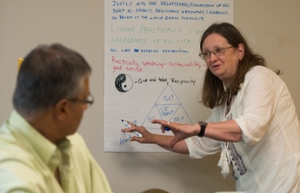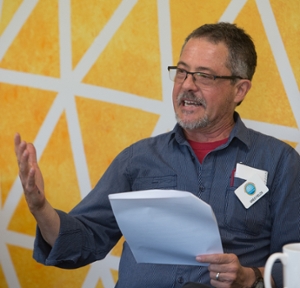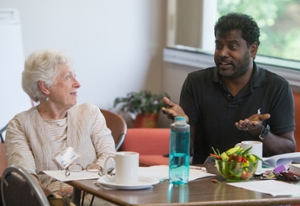
Fourteen educators and community workers from the region discussed their views, experiences and plans regarding the workshop’s theme, “The Value of the Humanities in Teaching and Learning about Sustainability.”

“Sustainability means a lot of different things to a lot of different people,” said David Bogler, PhD, adjunct professor of biology at Harris-Stowe State University (HSSU) in St. Louis.
“The challenge of sustainability is getting to the truth of the matter,” said Srinivasan Raghavan, sustainability manager at the University of Missouri-Columbia. “We can talk about trees and the environment, but we also need to address social justice and equality – that’s also being sustainable.”

When thinking about sustainability, it is good to look for insights from indigenous knowledge, according to SIUE Distinguished Research Professor Greg Fields, PhD, professor in CAS’ Department of Philosophy and expert in indigenous languages, oral histories, literatures, philosophies and lifeways. Fields gave a presentation on the connections between indigenous knowledge and sustainability.
“The myths and logos of indigenous thought is appropriate to answer some of the environmental, political and social problems that we have,” said Fields. “Native people survived and thrived without heavy technology for tens of thousands of years. Their getting wiped out had to do with colonialism.”
“The Native Americans introduced the ‘Three Sisters’ to the European settlers,” said Katja Kopp, MEd, global sustainability scholar/educator and retired science teacher. “They gave them corn, beans and squash to plant together. The corn uses nitrogen, and the beans put nitrogen back into the soil. They make a good diet of protein, starch and vitamins. These plants support each other. The waste product of one is the building material of another. The squash grows over the bottom and covers the soil, so it doesn’t lose water so quickly.”
“The Native Americans helped us farm and survive in this new place,” added Kopp.
Workshop participants were also encouraged to think about art and its connection to sustainability.
“Are there ways artists can help solve problems?,” asked Shelly Goebl-Parker, PhD, associate professor in the CAS’ Department of Art and Design. “Everything is connected, and art is a way to connect things.”
At least one participant said he had come up with three new ideas to incorporate sustainability into his curriculum at the conclusion of the workshop.
“It is essential for students to learn from those who have lifelong experiences of thinking and working on sustainable practices,” said Sasikumar Balasundaram, PhD, assistant professor in the Department of Anthropology. “I plan to have Betsy Slosar (Center for Spirituality and Sustainability board chair) speak to my class.” Slosar was a workshop participant.
Anbreen Bashir, PhD, associate professor of biology at HSSU, said she plans to incorporate even more sustainable lessons into her curriculum. One of Bashir’s sustainable lessons was in her cell biology class. She had her students compare their own living cells and organisms to cities. More specifically, comparing cells to a city’s water treatment and waste treatment process.
“This was a good way to show the importance of sustainability in my cell biology class,” she added.
There are many additional ways to spread the word of sustainability among students at SIUE, according to Dana Wynn, president of SIUE Student Organization for Sustainability (SOS) and Community Garden educator.
“We’re doing a good job of getting the message of sustainability out to the University campus,” Wynn said, “but I know we can do better, and make our lives and world more sustainable.”
Photos:
Participating in the workshop exercise, “What is sustainability and how do we connect to it?” is the Rev. Ellie Stock (right), community educator/activist/artist. Observing on the left is David Bogler, PhD, adjunct professor of biology at Harris-Stowe State University (HSSU).
SIUE Distinguished Research Professor Greg Fields, PhD, professor in the College of Arts and Sciences’ Department of Philosophy, gave a presentation on “Thinking about Connections between Indigenous Knowledge and Sustainability.”
Sasikumar Balasundaram, PhD, assistant professor in the SIUE Department of Anthropology, talks about the importance of locally grown and produced food. Listening is Betsy Slosar (left), Center for Spirituality and Sustainability board chair.